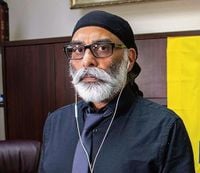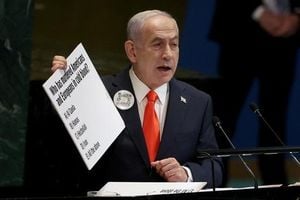Federal prosecutors in the United States have unveiled new details and charges in a high-profile case involving an alleged murder-for-hire plot with international ramifications. On September 26, 2025, US authorities alleged that the plot, which already stands out for its geopolitical implications, included plans for an additional assassination in either Nepal or Pakistan. The revelations, contained in recently unsealed court documents, have further intensified scrutiny on the case and the individuals involved.
Central to the investigation is Nikhil Gupta, an Indian national who was extradited from the Czech Republic to the United States in June 2023. According to the Department of Justice, Gupta is accused of attempting to orchestrate the assassination of a US citizen of Sikh faith residing in New York. The intended target, identified as Sikh separatist Gurpatwant Singh Pannun, has been a vocal advocate for the Khalistan movement, which seeks independence for India’s Punjab region. The case has drawn significant attention due to Pannun’s prominence and the sensitive nature of the allegations.
Prosecutors allege that Gupta did not act alone. Instead, they say he was given direct orders by Vikash Yadav, an officer with India’s external intelligence agency. Yadav, who remains in India, is alleged to have played a central role in directing the plot from abroad. As reported by The Tribune, the Department of Justice has accused Gupta of being the operative on the ground, carrying out instructions from Yadav to target Pannun in New York.
The case took a further twist on September 27, 2025, when US prosecutors added a drug trafficking charge against Gupta. This new charge broadens the scope of the investigation and could have significant implications for the prosecution’s case. According to The Tribune, the additional charge was filed following Gupta’s extradition to the US, underscoring the seriousness with which federal authorities are pursuing the matter.
The extradition itself was a complex affair. Gupta was arrested in the Czech Republic in June 2023, following a coordinated international effort. After months of legal proceedings, he was handed over to US authorities and now faces trial on multiple charges, including the alleged murder-for-hire plot and the newly added drug trafficking offense. Vikash Yadav, meanwhile, remains at large in India, beyond the immediate reach of US law enforcement.
The Department of Justice’s allegations have sent shockwaves through diplomatic circles, raising questions about the extent of involvement by foreign officials in criminal conspiracies on US soil. The specifics laid out in the court documents suggest a level of coordination and planning that has alarmed both law enforcement and political observers. The inclusion of potential additional targets in Nepal or Pakistan adds a further layer of complexity, suggesting that the plot was not limited to a single individual or location.
According to prosecutors, the core of the plot revolved around silencing critics of the Indian government abroad. Pannun, the intended target, has long been a thorn in the side of Indian authorities due to his advocacy for Sikh separatism and his outspoken criticism of India’s policies in Punjab. The US government has made it clear that it views any attempt to carry out extrajudicial killings on American soil as a grave violation of sovereignty and the rule of law.
Law enforcement officials have stressed the seriousness of the charges. As one prosecutor noted in court filings, “This case involves a brazen and dangerous plot to assassinate a US citizen on American soil at the direction of a foreign government official.” Such language underscores the gravity with which the US is treating the case, as well as the potential diplomatic fallout.
Gupta’s legal team, for their part, has not issued a public statement addressing the new drug trafficking charge or the expanded allegations regarding additional assassination plots. The defense is expected to challenge the prosecution’s evidence and may argue that Gupta was acting under duress or was not fully aware of the scope of the alleged conspiracy. However, the mounting charges and detailed allegations present significant hurdles for any defense strategy.
The Indian government has not publicly commented on the specific allegations against Yadav or the broader claims of involvement by intelligence officials. However, the case has already complicated India-US relations, with American officials privately expressing concern about the implications for bilateral cooperation on law enforcement and counterterrorism. The involvement of a serving intelligence officer, as alleged by US prosecutors, is particularly sensitive and could strain diplomatic ties if not addressed transparently.
Observers note that this is not the first time allegations of extraterritorial targeting have surfaced in connection with the Khalistan movement. In recent years, there have been reports of threats and attacks against Sikh activists in Canada, the UK, and other countries. The current case, however, stands out for the direct involvement of US authorities and the scale of the alleged plot.
For Sikh communities in the US and abroad, the revelations have reignited concerns about safety and the reach of foreign intelligence services. Pannun himself has previously spoken out about threats to his life, and the latest developments have only heightened fears among activists and their supporters. Civil rights organizations have called on US authorities to ensure the safety of individuals who may be at risk and to hold all responsible parties accountable, regardless of their nationality or official status.
The addition of a drug trafficking charge against Gupta also raises questions about the broader activities of those involved in the alleged plot. Prosecutors have not released detailed information about the nature of the drug trafficking allegations, but the charge suggests that investigators are looking at a wider pattern of criminal conduct that may extend beyond the assassination plot itself.
As the case moves forward, all eyes will be on the US courts to see how the evidence unfolds and whether further charges or revelations emerge. The potential for additional indictments or international arrest warrants remains, particularly if prosecutors can establish a broader conspiracy involving other individuals or entities.
The case of Nikhil Gupta and the alleged murder-for-hire plot against Gurpatwant Singh Pannun has already become a flashpoint in discussions about international law, sovereignty, and the responsibilities of states to prevent criminal activity by their officials abroad. With new charges and allegations continuing to surface, the story is far from over, and its outcome could have lasting implications for both international relations and the safety of political dissidents worldwide.




